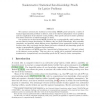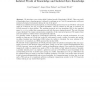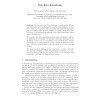60 search results - page 2 / 12 » Zero knowledge with efficient provers |
113
Voted
CRYPTO
2008
Springer
15 years 2 months ago
2008
Springer
We construct noninteractive statistical zero-knowledge (NISZK) proof systems for a variety of standard approximation problems on lattices, such as the shortest independent vectors...
133
Voted
EUROCRYPT
2008
Springer
15 years 2 months ago
2008
Springer
We introduce a new notion called -isolated proofs of knowledge ( -IPoK). These are proofs of knowledge where a cheating prover is allowed to exchange up to bits of communication wi...
93
Voted
SCN
2004
Springer
15 years 6 months ago
2004
Springer
Abstract. We introduce and define the notion of identity-based zeroknowledge, concentrating on the non-interactive setting. In this setting, our notion allows any prover to widely...
109
Voted
FOCS
2003
IEEE
15 years 6 months ago
2003
IEEE
We show how a polynomial-time prover can commit to an arbitrary finite set Ë of strings so that, later on, he can, for any string Ü, reveal with a proof whether Ü ¾ Ë or Ü ...
98
Voted
TCC
2005
Springer
15 years 6 months ago
2005
Springer
Abstract. We introduce Fair Zero-Knowledge, a multi-verifier ZK system where every proof is guaranteed to be “zero-knowledge for all verifiers.” That is, if an honest verifi...



